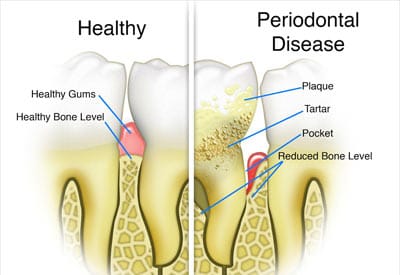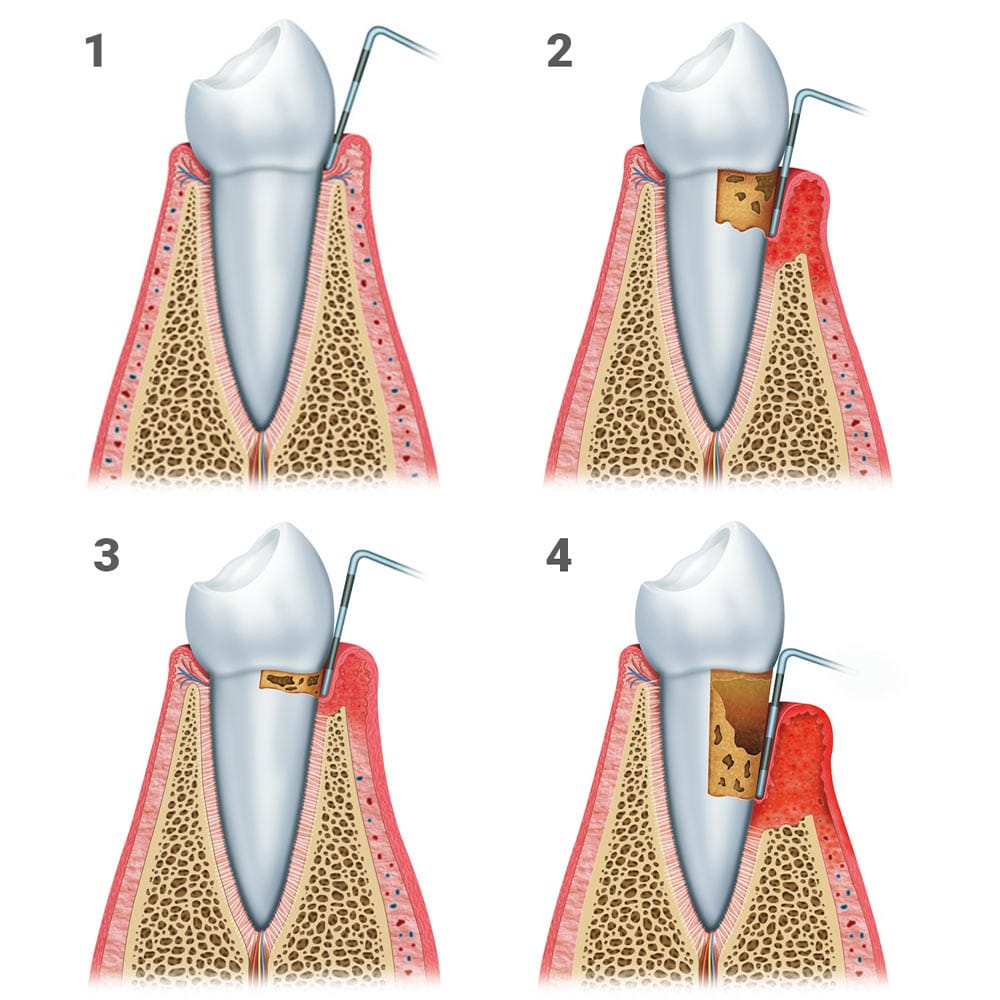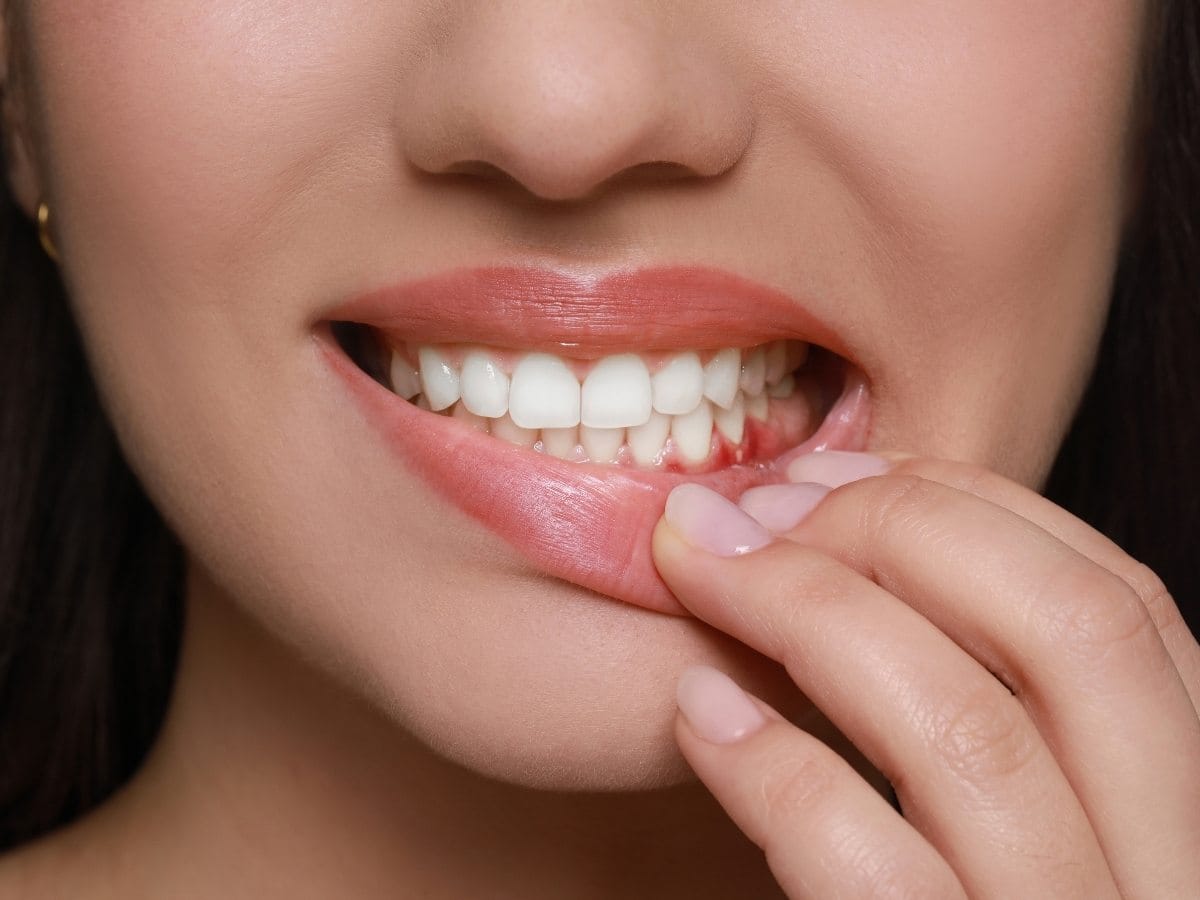What is Periodontal Disease?
 Periodontal disease is an infection caused by the bacteria in dental plaque. Everyone has dental plaque, as it is a sticky biofilm that continually forms over your teeth.
Periodontal disease is an infection caused by the bacteria in dental plaque. Everyone has dental plaque, as it is a sticky biofilm that continually forms over your teeth.
Most plaque is removed by proper brushing and flossing. Any remaining plaque hardens into calculus or tartar within a few days. The bacteria in plaque and tartar produce toxins that infect and inflame your gums.
The infection will spread from your gums into your jawbone as it worsens. It can destroy your gums, jawbone, and periodontal ligaments that hold teeth in their sockets. Eventually, it can cause tooth loss or impact your overall health.
What Are the Symptoms of Periodontal Disease?
Symptoms can include:
- Bleeding gums, especially when you brush or floss
- Red or purple colored gums
- Gums that feel tender or sore
- Bad breath (halitosis)
- Receding gums
- A persistently unpleasant taste
- Changes to the way your teeth bite together
- Loose teeth
The early signs of periodontal disease are easy to overlook, so we recommend regular dental exams to check for this common condition.
What Are the Stages of Gum Disease?

There are several distinct stages of gum disease outlined below.
- Gingivitis. This is the early stage of gum disease, so your gums may slightly bleed when you brush or floss, but you may have no other symptoms. At this point, your gum disease can be reversed with proper professional dental care and improved oral care at home.
- Mild periodontal disease. At this point, the bacteria have penetrated your gums, which may have begun to pull away from your teeth, creating gaps between your gums and teeth. The bone around your teeth could also become infected.
- Moderate periodontal disease. By this stage, the bacteria have begun to destroy your gums, jawbone, and ligaments holding your teeth in place. You will likely have other symptoms like bad breath, and your gums could feel painful.
- Advanced periodontal disease. Without treatment, gum disease will continue to worsen, and your teeth may feel loose or eventually fall out.
What Can Cause Periodontal Disease?
Dental plaque buildup is the main cause of periodontal disease, and it’s more likely that you will develop this condition if you have poor oral hygiene.
However, other factors can increase your risk of developing gum disease. These include:
- Smoking or using tobacco products
- Heart disease
- Diabetes
- Conditions affecting your immune system include Crohn’s disease, scleroderma, or lupus
- Hormonal changes that occur during puberty, pregnancy, and menopause
- Stress
Genetics is another factor, so if your siblings, parents, or grandparents have gum disease, your risk of developing this condition is higher.
What Are the Potential Complications of Gum Disease?
Advanced gum disease or periodontitis can cause complications affecting your overall health. Numerous clinical studies have indicated a link between advanced periodontitis and serious health problems, including diabetes, respiratory illnesses, and heart disease.
The problem occurs because the infection causes your gums to bleed easily. These open wounds allow infectious bacteria to enter your bloodstream. Once inside your blood, they can cause new sites of infection and inflammation.
Periodontitis can increase your risk of developing serious health problems. It may worsen any problems that already exist. For example, people with diabetes are more prone to developing gum disease, but if they have advanced periodontitis, it can make it harder to control blood sugar levels.
Can I Catch Gum Disease?
The bacteria that cause gum disease can be transferred from one person to another through close or intimate contact, such as kissing. However, unless you have other risk factors, the chance of developing gum disease is low, especially if you have good oral hygiene.
How Is Periodontal Disease Diagnosed?
When you visit Clock Tower Dental, we can assess your gum health and arrange a complete gum evaluation with our periodontist if necessary.
During the evaluation, the pockets or gaps around your teeth are measured using a periodontal probe. The periodontal probe measures the depth of these pockets. Healthy gums have a depth of no more than 3 mm, so if you have pockets deeper than this, you likely have some degree of gum disease. The deeper the pockets, the more severe your periodontitis.
Our periodontist will also evaluate your bite to check for signs of loose teeth and look at other symptoms, such as gum recession or pus around your gums. Digital dental X-rays will show any bone loss in greater detail. These can be compared with older X-rays to check for bone loss over time.
Custom Periodontal Disease Treatment Plans
If we identify any gum disease signs, we can provide a suitable periodontal disease treatment plan. Your gum treatment plan aims to help restore gum health and eliminate or control the bacterial infection. Your plan will also outline any other procedures needed, such as receding gums treatment or gum abscess treatment.
Our periodontist, Dr. Nejat, can ensure you receive the most advanced periodontal treatments that provide the best outcome.
Can Periodontal Disease Be Cured?
Gingivitis, or the earliest stage of gum disease, is curable. More advanced periodontal disease is incurable, but it can be managed.
Usually, it isn’t curable because you have already lost gum or bone from around your teeth. Once these structures are destroyed, they can be partially replaced with gum or bone grafting.
The sooner you receive treatment, the more likely we can cure periodontal disease completely. Severe periodontal disease is a very different matter and can be chronic, requiring ongoing treatment from a periodontist.
Can I Prevent Periodontal Disease?
Although some people are more prone to developing gum disease, it is generally preventable. You can reduce your risk of developing periodontal disease by following the tips below.
- Brush your teeth at least twice daily.
- Floss between your teeth every day.
- Use antimicrobial mouthwash.
- Quit smoking or using any tobacco products.
It’s important to visit us regularly for dental exams and hygiene appointments. We can ensure you maintain healthy gums more easily by monitoring your health closely.
We can detect any changes to your gum health sooner and provide appropriate gum infection treatment much earlier. We have an excellent hygiene team who can ensure you are using the proper brushing and flossing techniques at home, removing more dental plaque before it can cause problems.

